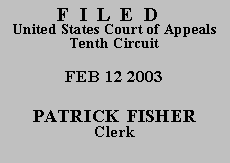

| ANTHONY J. SMITH,
v.
ROBERT FURLONG; and
ATTORNEY GENERAL OF THE
STATE OF COLORADO, |
(D. Colorado) |
Before EBEL, HENRY, and HARTZ, Circuit Judges.
After examining the briefs and appellate record, this panel has determined unanimously to decide this case on the briefs without oral argument. See Fed. R. App. P. 34(a)(2). The case is therefore ordered submitted without oral argument.
Anthony J. Smith, a state prisoner proceeding pro se, requests a certificate of appealability (COA) so that he may appeal the district court's denial of his 28 U.S.C. § 2254 habeas petition. He also seeks permission to proceed in forma pauperis (IFP). In his § 2254 petition, Mr. Smith argues that his continued incarceration violates his rights to due process, equal protection, and liberty. The district court determined that Mr. Smith remains validly in custody based on the revocation of his parole and denied his petition. For the reasons stated below, we deny Mr. Smith's request for a COA and dismiss the appeal.
In 1987, Mr. Smith was serving a fourteen-year sentence in a Colorado prison for first degree assault when he received an additional two-year sentence for attempted escape. He was paroled in May 1993, and subsequently remained on parole for two years and nine months until his parole was revoked. He was paroled again in August 1997, until that parole was revoked in January 1999 for escape from parole. He received a sentence of eight years in prison followed by five years mandatory parole for his escape from parole.
Mr. Smith asserts that upon his parole for the first degree assault and attempted escape convictions, he should have received credit for his time served while on parole. He also contends that once parole is granted, the prior sentence "had to be seen as discharged." Aplt's Br., addendum at 5. Colo. Rev. Stat. Ann § 17-22.5-101 states that "when any inmate has been committed under several convictions with separate sentences, the department shall construe all sentences as one continuous sentence." Mr. Smith claims that under that statute, to reincarcerate him for a sentence that has been discharged is unconstitutional.
As an initial matter, we note that although both Mr. Smith and the district court treated his habeas corpus petition as a § 2254 petition, because Mr. Smith is challenging the implementation of his sentence, rather than the validity of the underlying conviction, his petition is properly characterized as a 28 U.S.C. § 2241 petition. See Montez v. McKinna, 208 F.3d 862, 865 (10th Cir. 2000). Because the merits of Mr. Smith's petition are the same under either statute, there is no need to remand to the district court. See id. at 865.
Because Mr. Smith is a state prisoner, he must obtain a COA to appeal the denial of a § 2241 petition. See id. at 868-69. To be entitled to a COA, Mr. Smith must make a "substantial showing of the denial of a constitutional right." Id. at 868 (quoting 28 U.S.C. § 2253(c)(2)). He may make this showing by demonstrating that the issues he raises are debatable among jurists, that a court could resolve the issues differently, or that the questions presented deserve further proceedings. See Slack v. McDaniel, 529 U.S. 473, 483-84 (2000).
Even applying a liberal construction of Mr. Smith's pro se pleadings, see Haines v. Kerner, 404 U.S. 519, 520 (1972), his arguments fail. Colorado law provides, by statute, that, upon the revocation of parole,
(1) [t]he paroled inmate, upon an order of the state board of parole, may be returned to the custody of the department according to the terms of his original sentence, and, in computing the period of his confinement, the time between his release and his return to said custody shall not be considered any part of the term of his sentence.
(2) Parole shall not be construed in any sense to operate as a discharge of any inmate paroled under the provisions of law but simply a permit to any such inmate to go outside a correctional facility. . . . If the said paroled inmate is returned to the department, he shall serve out his original sentence, as provided for in this part 2.
Colo. Rev. Stat. Ann § 17-22.5-203(1)-(2) (West 2000) (emphasis added). Mr. Smith argues that once his sentences for first degree assault and attempted escape have been combined for the determination of a parole eligibility date, this combined sentence could not be reimposed after the revocation of parole. Because parole is not a discharge but merely a permit to go outside the correctional facility, see id., this assertion lacks merit.
Accordingly, we DENY Mr. Smith's request for a COA, we DENY his motion for IFP, and we DISMISS the appeal.
Entered for the Court,
Robert H. Henry
Circuit Judge
*. This order and judgment is not binding precedent, except under the doctrines of law of the case, res judicata, and collateral estoppel. The court generally disfavors the citation of orders and judgments; nevertheless, an order and judgment may be cited under the terms and conditions of 10th Cir. R. 36.3.